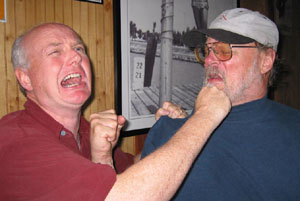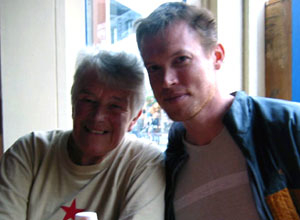Notes from the Key West Literary Seminar

Literary Feud: Patrick Symmes and Tim Cahill duke it out in Key West (see below)
It’s been a few weeks now since I attended the Key West Literary Seminar — which featured a “travel and adventure” theme, and boasted a great slate of A-list travel writers, from Peter Matthiessen, to Gretel Ehrlich to Pico Iyer, to Tim Cahill, to Robert Stone. It was my first-ever sojourn to a conference of this sort, and I found it a great experience that I’d recommend to anyone.
I met a wide range of interesting people in Key West — average folks and travel scribes alike — but I’ll comment here on the writers I met, since I rarely have the opportunity to meet the luminaries of my genre.
So, in no particular order, here are some impressions:
- Pico Iyer was, without a doubt, the rock-star of the gathering, due largely to his effortlessly articulate opening speech, “A New Kind of Travel for a New Kind of World” (which I have been — and will be — excerpting on this blog). Those who were unfamiliar with his work before the conference went scrambling to his bio page as the speech went on, and he was in high demand for the rest of the week.
- Former U.S. poet laureate Billy Collins was the other rock-star of the gathering. Way back in 1998, when I first set up my RolfPotts.com website as a way to pitch Salon.com on a travel column, I used Collins’s end-of-the-millennium poem “Dancing Toward Bethlehem” as my front-page epigram. I mentioned this when I introduced myself to him at the seminar, and we later chatted about what types of experiences qualify for poems and travel stories alike (we both agreed that literary conference experiences don’t typically fit the bill). As we spoke, I was surprised to learn that he’d never heard of Allen Ginsberg’s 1966 anti-war road-trip poem “Wichita Vortex Sutra” (I thought every poet would know it, but then I grew up in Wichita so perhaps I’m biased). Collins said he’d never been all that impressed with Ginsberg’s anti-war poetry, but that he’d check out “Wichita Vortex Sutra” when he got home.
- One of my favorite personalities from the seminar was Tim Cahill, who is possibly the most disheveled non-homeless individual I’ve ever met. He’s even quirkier and funnier in person than in his writing, and his wife Linnea was good fun too. I joined the Cahills and adventure scribe Lawrence Millman (who might qualify as the second-most disheveled individual I’ve met) one night for oysters and whiskey, and they all merrily drank me under the table while we argued about evolutionary psychology, the idea of the “global soul”, and the proper use of past tense.
- Patrick Symmes and Michael Shapiro also made for good drinking company during the seminar. At one point, I suggested to Symmes and Cahill that — in the interest of raising the profile of the travel-writing milieu — they start a big, bombastic, public literary feud with one another. They both thought this was a splendid idea, but as the night wore on it became clear that both writers were too affable to actually make this happen (though, as evidenced above, they were able to pose for some moderately convincing fistfight photos).
- Adventure writer Kira Salak had a detached intensity that made her somewhat difficult to talk to (Thomas Swick alluded to being blown-off by her in his World Hum blog of the seminar). And, while her adventures in various parts of the world (hiking solo across Papua New Guinea, paddling solo down the Niger River, etc.) are impressive for someone of any gender, listening to her talk at the seminar made me nervous for her future safety. Indeed, she continually left the impression that she seeks extremely dangerous experiences for arbitrary reasons — her next stated adventure is traveling across Iraq and Iran by donkey — and even Peter Matthiessen publicly implored her to be careful in her travels.
- Speaking of Thomas Swick, I enjoyed meeting him after following his newspaper travel column for several years — and I liked that he wasn’t shy about disagreeing with people. For example, Swick countered Iyer and Cahill’s assertion that the best travel stories happen by accident, pointing out that his best stories have come from good trips with proper planning and pre-arranged contacts. Bruce Chatwin famously felt the same way (though I personally tend to side with Iyer and Cahill). My favorite quote from Swick’s blog of the experience was this: “What is impressive is how many good travel writers there are in this country when the travel magazines continue to obsess about resorts and spas.” Indeed.
- Perhaps the most impressive traveler-writer I met in Key West was septuagenarian Irishwoman Dervla Murphy, with whom I had the pleasure of sharing a Guinness after the last panel. Though she’s in her seventies, Murphy travels solo to far-flung places like Ethiopia and Laos, traveling close to the ground (often on foot or by bicycle) and writing engaging books about the experience. She’s also very gracious in person, and truly interested in what one has to say. The only thing that struck me as odd about her came when we were talking about global aid agencies, and I made reference to something I’d read in The Economist. “The Economist is terrible,” she said. “I’d never read a magazine like that.” Given Murphy’s socialist leanings (Murphy wore at Che Guevara t-shirt for one panel), I can see why she’d disagree with the pro-market content of The Economist, but I was a little startled by her assertion. After all, any good socialist would do well to familiarize herself with the most intelligent arguments for capitalism (if only to refute them) — and any mindful traveler would do well to learn how global economies work (if only to recognize their negative — or positive — impacts abroad).
- This in mind, I’d reckon that one weakness of the seminar was a total lack of political diversity among the panelists. At times, the panel discussions came off sounding like another episode of “Liberals Being Self-Congratulatory” (the longest-running show in American letters), and the presence of an intelligent, well-traveled rabble-rouser like P.J. O’Rourke might have spiced things up considerably. As Swick and South Florida Sun-Sentinel book critic Chauncey Mabe have already implied in their writings on the seminar, Barry Lopez in particular aired his politics with such humorlessness and pompous self-regard that he put himself in the rare position of a preacher who sends his own choir streaming toward the exits. Granted, the environmental causes he espouses are important, but (since the political success of environmental issues depends on appealing to empathetic conservatives) I can’t help but think that the cause would be better served if Lopez kept his ego in check and stuck to writing and research.
- Speaking of critic Chauncey Mabe, I had the pleasure of hanging out with him on several occasions at Key West, but I disagree with his assertion (made later, in his newspaper column) that “travel writing is among the trivial genres.” Mabe is certainly not the first critic to make this sort of declaration (indeed, were there a trade school for literary critics, “Bashing Travel Writing” would be a 101-level course), but this notion seems more tiresome each time I hear it. In fact, to paraphrase something Ryszard Kapuscinski said nearly 20 years ago, I find it befuddling that the modern mainstream literary world is obsessed with stories of domestic turmoil
, suburban hanky-panky
and solipsist-confessional horseshit
in a time when massive human movement across cultures (in both the figurative and physical sense) is the story of our age. To ponder whether or not it’s moral to travel “in an age of global warming, social unrest and terror” strikes me as beside the point — an empty exercise in rhetorical hand wringing. Regardless of what café moralists think, writers who are willing to travel slowly and report honestly about other cultures are vital in a country where most world regions don’t merit media coverage unless they’ve recently been host to a natural disaster, a large explosion, or a Hollywood film-shoot.
My thanks to Key West Literary Seminar executive director Miles Frieden for making my attendance possible! For more information on the KWLS (next year’s theme is “Mystery, Intrigue, and Psychological Drama”), click here.
Key West blog photos courtesy of Michael Shapiro (who you can click here to see having a Guinness with Dervla Murphy; that’s Dervla and me below…).

Guinness time:Dervla Murphy and Rolf share a beer in Key West.

February 3rd, 2006 at 2:43 pm
I also had the pleasure of attending this year’s Key West Literary Seminar and came away with similar positive feelings about spending time in the company of such thoughtful writers of travel. Here’s a link to the newspaper article I wrote for the occasion. https://www.post-gazette.com/pg/06022/640913.stm
January 13th, 2008 at 12:17 pm
Yo, I just finished Lawrence Millman’s “Last Places” and atempted to read your full interview, but got bumped into a cyber space dead zone. The tag on the dead zone mentioned that you are redoing your site and that maybe I got bumped in error. I would like to read your interview and await instructions. Lance